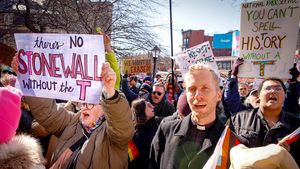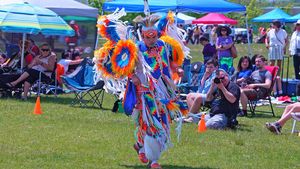Author Jennifer Finney Boylan has an extensive library in her office at Barnard College, including titles from her friend Richard Russo and former student Maggie Nelson. Part of the view from her window is a construction site with a crane in the sky lifting an American flag from its hook, backdropped by storm clouds. She leaps up to document the experience on her phone before declaring, "I'm an American citizen--I'm a proud American citizen and I don't see myself on the fringes of this culture, I see myself right in the center. Nobody gets to own America. You don't get to take America back, because America was never yours to begin with."
Boylan, the author of 15 books including her forthcoming novel Long Black Veil, meets with OUT on Inauguration Day in January. Ideas about legacy and visibility are fresh on her mind, evidenced by her hopes that, "people will view me, not only as one of the ever-increasing numbers of transgender showgirls and poster girls, but also as a writer, as a serious writer and someone who has dedicated her life above all to the crafting of story."
Long Black Veil is the latest mark she is making with her literary canon, a mystery novel in which she intends to ask, "How do you live if you've lived a life with a very clear before and after? How is it possible to live one life rather than two? How do we bridge who we become with who we were?" She laces discussion of the book with details about her own past, including mention of her Morningside Heights apartment from 1980, blocks away from her current office. Yet she eschews the mourning of place to focus on remembering people, keeping their stories alive, "because everybody deserves a past."
OUT: Long Black Veilis your first mystery novel for an adult audience. What was it about suspense that attracted you?
Jennifer Finney Boylan: I'm less interested in "who done it" than in the secrets that people bear with them. In my own transition the biggest change was not in going from male to female, but in going from a person who bore many secrets to someone who has few, or none.
The trouble I used to have with writing suspense was that I'd always get stuck on villains, because villains are hard to write. You have to remember that people never see themselves as villains. People tend to think of themselves as good. Donald Trump thinks of himself as a good man. We're having this conversation two hours after Donald Trump was inaugurated. My first act of the Trump administration is having a conversation with OUT, which is pretty cool for me. It's my first act of resistance.
Long Black Veil's crime scene takes place among the ruins of Philadelphia's Eastern State Penitentiary, a rumored haunted site. How do hauntings inform the story?
I've written about ghosts before, especially in my memoir I'm Looking Through You. I think that anyone who's had a major change in their lives might find themselves haunted by the before and the after, and struggle to find a connection between who they have been and who they have become. No one ought to be defined by what they were, we should all be seen for who we are. So "haunting" is an interesting way to think about the way people make sense of their own pasts.
For transgender people there's a particular twist to that. I've lived a third of my life as a boy, a third of my life as a married man with a family, and a third of my life as a woman. My experience as a woman is not exactly new. I do think about how I got here and struggle with the question, "What does it mean to be a woman who never had a girlhood?"
Long Black Veil's protagonist lives her life in stealth as a trans woman. How did you approach writing about stealth?
Stealth is a phrase we don't hear quite so much of anymore. It used to be the way trans people were prescribed to live their life. You were supposed to come out, start hormones, have surgery, move a place where you knew no one, and start your life over. If anybody asked you about your former life, you were supposed to lie.
I know plenty of people living in stealth--people who went through transition but who are not known by others to be trans. In a story about secrets, and about telling the truth, it struck me as worth examining why people don't always share the whole truth with each other. It's just hard. Even now, it's hard. It's no simple thing to reveal one's truth. People always say, "Just be yourself," as if that's so easy, as if telling the truth was second-nature to all of us. If telling the truth was so easy, I bet it would be more popular.
Long Black Veilopens in on 1980 where, "Carter was still president, Reagan an unlikely joke." What is the significance of starting the book in this decade?
I wanted to see how the effects of a tragic mystery that haunt a group of friends throughout all their lives--to start far back enough in time to allow all the characters to grow up and have lives--and still find themselves haunted.
Coming out in the 1980s was a wholly different experience than now. In those days, there wasn't any discourse about gender identity. Even in 2000, when I came out, there were a lot of people who felt that just because they hadn't experienced the particulars of gender dysphoria, it must be something that doesn't really exist, or that a trans person's identity needs to be interrogated and ruthlessly picked apart again and again.
What would you want your younger self to know in 1980?
I think I'd want to know that life can take a long time to reveal itself to you, and that whatever pain I held in my heart then would not be something I would bear forever. I would want my young self to know that I was capable of love, and that I was deserving of love, and that as years went past my ability to love and be loved would increase, not decrease. I would want to tell myself not to worry so much about what other people think.
Purchase Long Black Veil, here.













































































